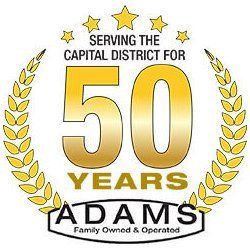GENERAL QUESTIONS
-
What are the benefits of an Adams service plan?
With an Adams service plan, you get 24-hour emergency assistance, priority scheduling, regular inspections, and discounts on parts and service!
-
What brands are the best for heating and cooling?
Adams has a simple outlook on products: there’s the best and then there’s everything else. We carry a wide line of Bryant and Rheem products because of their commitment to quality and the availability of any necessary parts. Everything else is just everything else.
That said, three things are even more important than the products themselves: the advice you get before you purchase, the quality of installation, and the reputation of the dealer. At Adams, you get only the best.
-
Do you offer financing?
Yes! Financing is available with approved credit.
-
Why are some rooms always hotter or colder than others?
This is a typical problem. Often, one room that can’t keep up with others is at a weak spot in the system. This may mean that its ducts have more bends than all the others or that it receives more sunlight or shade than the other areas of the house. Likewise, windows and wind currents can greatly affect a room’s temperature.
-
What can I do to fix it?
Usually, something called balancing will help address the problem. Balancing is when you direct air away from where it isn’t needed and toward where it is needed. For example, if a room on one side of the house is always colder than the others, try closing one or two of the vents (also called dampers) in an attic or basement to force more warm air into the problem room. In addition, make sure the room is properly insulated and that windows are sealed and have appropriate shading. As a final option, you can look into “zoning” problem rooms to get a more exact solution.
AIR QUALITY QUESTIONS
-
How often should I have my air ducts cleaned?
We recommend getting your ducts cleaned at least once every 8-10 years. However, if you can see accumulations of dust on the inside duct walls, then it’s time for a cleaning to prevent dust mites that can contribute to asthma and allergies.
-
When I do clean my ducts, do I need to get it done professionally?
Of course it’s up to you, the homeowner, but consider that in addition to the dust and debris that accumulates in the ducts themselves, they could be littered with viruses, allergens, bacteria, and dust mites. Not only that, but this build-up can affect the heating or cooling coil itself. In short, just because it looks clean, doesn’t mean it IS clean. Adams has the experience and the equipment to clean the entire system, top to bottom.
-
Does it really matter what kind of filter I use with my furnace?
Absolutely! A high grade filter helps you breathe cleaner air, helps maintain the efficiency of the heating or cooling unit, and can actually extend the life of the unit by helping to prevent motor failure and other problems. The key thing to remember is that just because the unit is new, this doesn’t mean the filter that came with it is anything but the most standard type.
-
What kind of filter should I use?
Ideally, you should use something called a media filter that sits between the ducts and the blower cabinet and improves the air quality as it leaves the central unit. Next would be a high-efficiency pleated filter. You can look at electronic air cleaners or HEPA air filters, which look to kill germs/bacteria.
-
How often should I replace or wash my air filter?
Disposable filters should be changed once a month to maintain cleaner air, and washable filters should be cleaned once a month. Higher-efficiency filters do have longer life spans, but it is critical that these, too, get changed when they’re due.
-
Does dust really cause THAT many problems?
The Environmental Protection Agency has found that the average house has air up to 70 times more polluted than outdoor air! Not only that, just .42 inches of dirt inside your heating or cooling system can cut your efficiency by 21% and most system failures (9 out of 10) are caused by dirt and debris.
-
Is there any real reason to buy a UV air purifier?
There are several. Ultra-violet purifiers use a specially designed UV lamp to kill mold, viruses, and bacteria from the air that flows through your house. Aside from getting rid of the bad stuff at the source, it also removes odors from the home.
-
Are there any health benefits that come from filters or duct cleaning?
One of the central collection points for bacteria and viruses is your heating and cooling system. That means that small adjustments like a better filter or having ductwork cleaned regularly can eliminate a major source of contaminants.
-
How do I recognize carbon monoxide in my home?
Carbon monoxide is invisible and odorless and, in large enough quantities, can be deadly. Light CO poisoning can cause headaches, lightheadedness, and fatigue. Every home should have a working, regularly tested CO alarm. In fact, some states, including New York, require them by law.
-
How do I prevent CO from entering my home?
First, make sure your heating system is inspected annually by a licensed professional at the beginning of the heating season. Second, use caution when operating any space heaters to ensure there is enough fresh air supply. Third, maintain chimneys and flues with great care as they can pour CO into living spaces.
-
I have a CO alarm. Won’t it let me know if something’s wrong with my system?
While your CO alarm is a crucial implement, don’t take the alarm’s silence for an “all-clear.” Ongoing exposure to even slight amounts of CO can have cumulative effects. An annual inspection is the best way to make sure your air is safe.
-
Do I need a humidifier for my home?
Yes, each home should have a humidifier. Aside from making your winter air more comfortable by reducing dry noses, dry skin, and dry throats, a humidifier can also prevent cracking in wood floors and furniture.
-
I have an old pan humidifier. Do I really need a new one?
Yes. Today’s humidifiers don’t use pans for the simple reason that a pan of lukewarm water is an excellent environment for bacteria. This bacteria then gets sent through your home in the air.
-
My humidifier isn’t working. What can I do?
Often a humidifier not working is caused by simple forgetfulness. Remember to open any dampers or water valves at the beginning of the season. Likewise, remember to clean the humidifier’s panel or pad. If it’s clogged, it won’t work properly.
AIR CONDITIONING QUESTIONS
-
When should I have my air conditioner(s) checked?
Always have your system checked at the beginning of the season. This goes for both cooling and heating. This will ensure that your system is and will be running at top efficiency before you need it most.
-
What is SEER?
SEER stands for Seasonal Energy Efficiency Ratio and is the way all AC units are rated. A unit’s SEER rating is determined by dividing the total cooling output (in BTUs) by the total energy input (in watt-hours). Basically, how much cold air you get divided by the power it takes to run the unit.
-
How much SEER do I need?
The higher the SEER rating, the more efficient the unit. Energy Star products have a SEER rating of 14, which is probably ideal for most homes. However, with a larger initial cost, you can purchase units with even higher efficiency.
-
My circuit breaker keeps tripping. What can I do?
First and foremost, realize that the circuit breaker is tripping for a reason: to protect the circuits of the house and the equipment. Don’t just keep resetting it! Often these breaks can be caused by loose connections in aluminum wiring that can expand and contract slightly with weather changes. Another typical cause is an actual short in the wiring or the equipment itself. Do not try to fix this problem yourself! Call Adams for service immediately. Finally, your outdoor compressor might trip the breaker because it’s old, weak, or tight and simply having trouble getting started again. In this case, a “hard start kit” could be a simple solution to the problem.
-
Do I need to cover my outdoor unit in the wintertime?
No. AC units are built to withstand all weather conditions.
-
Is it okay to plant shrubs or flowers near my outdoor unit?
Yes, but be sure to leave enough room for operation. You should leave about 18 inches between the unit and any shrubs, flowers, or yard items to ensure effective operation. Put things too close and the unit could start to overheat, causing premature maintenance needs.
-
How can I get the most from my AC unit?
High SEER ratings are a great first step, but getting the most from your investment will depend largely on your home and small changes you can make. In addition to the best units in the business, Adams can give you a total efficiency plan tailored to your home’s needs.
-
How long will my AC unit last?
This is, of course, an excellent question. Unfortunately, it depends almost entirely on specific variables in your home including the unit itself, how it’s used, and regular maintenance. If you’re concerned about your existing system, call Adams today for a consultation. If you’re looking for a new system, Adams can give you a better idea of lifetime and maintenance schedules based on your home’s variables.
HEATING QUESTIONS
-
What is a BTU?
British Thermal Units refer to how much energy is needed to heat one pound of water by one degree (Fahrenheit). However, with heating and cooling systems, BTUs more generally refer to a unit’s capacity to raise or lower air temperature quickly. The more BTUs in a unit, the more power it has. Bear in mind, however, that higher BTUs can be costlier to operate.
-
Are there benefits of converting to natural gas from oil?
The major problems with heating oil are unstable rates, unreliable supply, high maintenance costs, leaky oil tanks, and the potential for soot entering the home. Natural gas, on the other hand, burns cleaner and has a more consistent price and supply and a higher efficiency rate.
-
What causes cracks in a gas furnace heat exchanger?
Consider the function of the heat exchanger: heating up, and then cooling down, over and over. All substances expand when they’re heated and contract when they cool. Over time, even metal begins to wear and crack, particularly at “weak spots” like welding joints and areas with corrosion caused by exhaust venting problems.
-
How serious is a crack in my heat exchanger?
Extremely. If your heat exchanger or furnace has a crack or hole, it means toxic carbon monoxide is leaking into your home. It is crucial that a licensed professional check your heating system in the fall as the winter is a high risk time for carbon monoxide poisoning.
-
I’m looking to replace my old furnace. Do I need something that’s high in BTUs?
Probably not. In the last ten years alone, enormous advancements in technology and materials have allowed heating units to be upwards of around 90% efficient. An Adams specialist can guide you on what system is right for you.
-
How do I know when my system needs replacing?
The short answer is as soon as it starts giving you problems. However, with recent advancements and higher-efficiency units hitting the market every day, it is wisest to call Adams and get a full consultation. Chances are that if your unit is ten or more years old, you could be saving a lot more over the long term by upgrading now, particularly considering various energy rebates.
-
What does AFUE mean?
AFUE stands for Annual Fuel Utilization Efficiency. AFUE ratings range anywhere from 80% AFUE to as high as 98% AFUE. The higher the AFUE, the more efficient the unit.
HOME ENERGY SOLUTIONS
-
What is an HRV unit?
HRV stands for Heat Recovery Ventilator. In essence, it’s an air exchanger that uses warm OR cool air already in your home to heat or cool incoming fresh air. That means you get fresh air without losing efficiency.
-
Should I have a programmable thermostat?
Absolutely. A programmable thermostat allows greater control over heating and cooling and can save you enough to pay for itself within two years and possibly make you eligible for key government rebates.
-
Is it worth buying Energy Star products?
Yes. The Energy Star symbol is a government-assigned guarantee that the product meets certain efficiency standards. This will translate to major savings on utility bills and will result in drastic reductions in the amount of pollution. These products run the gamut and include thermostats, boilers, heat pumps, and air conditioners. While these products have a slightly higher up-front cost, their long-run savings pay for themselves.
-
What is an Energy Audit?
Imagine an IRS tax audit and then take away everything bad. While that leaves precious little, it does leave an exhaustive evaluation of your home. In an Energy Audit, an Adams technician goes step by step through your heating and cooling system to pinpoint any places where energy is being wasted or money being lost. Unlike the IRS, Adams is looking to SAVE you money by generating a tailored set of recommendations to improve your home’s efficiency.
-
How can an Energy Audit reduce my HVAC costs?
Running a Heating, Ventilation, and Air Conditioning (HVAC) system costs money, but how much money depends on a lot of variables. Some of these variables, like insulation and air-flow, you can control and some of them, like climate and weather patterns, you can’t. An Adams specialist can help you compare costs of the things you can control and better prepare you for those things you can’t.





